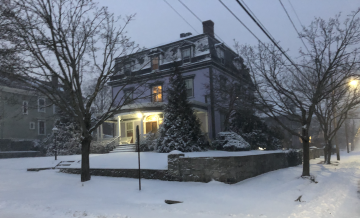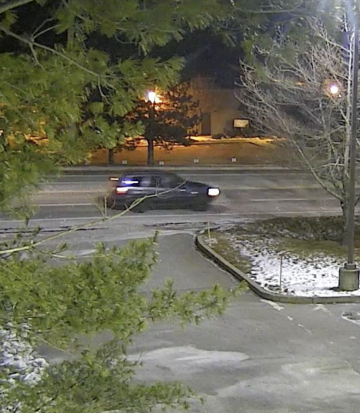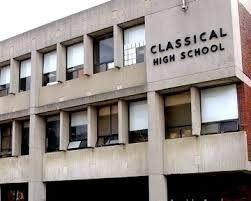Whitcomb: ‘Poor Farmers’ Fertilizer’; Dubious ‘Stars’; Pells and Plumbers; Regressive Taxes
Sunday, January 14, 2024
“In windless cold that is the heart’s beat,
GET THE LATEST BREAKING NEWS HERE -- SIGN UP FOR GOLOCAL FREE DAILY EBLASTReflecting in a watery mirror
A glare that is blindness in the early
Afternoon.’’
-- From “Little Gidding,’’ in “Four Quartets’’ (1943), by T.S. Eliot (1888-1965), the Anglo-American poet
“A little inaccuracy sometimes saves tons of explanation.’’
-- Saki (whose real name was H.H. Munro (1870-1916), British writer
“Government was not created to save money and to cut debt, but to take care of people. That’s my theory of government.”
-- James Michael Curley (1874-1958), the corrupt and flamboyant Democratic politician who served off and on as Boston mayor and inspired the novel and film The Last Hurrah. He had an amazing memory – e.g., my paternal grandfather, a Republican, met him at some function in the late ’20s when they superficially conversed for a few minutes about their families. Around 1950 they ran into each other again – only their second encounter. Curley remembered the names of my grandmother and the children, the name of the company my grandfather was about to retire from and where they were living.
And he quoted Alexandre Auguste Ledru-Rollin (1807-1874), French politician: “There go the people. I must follow them, for I am their leader.’’
xxx
As one gets older, the world seems, in turn, more mysterious, more beautiful, uglier, and scarier.
xxx
Winters can be an inconvenient bore while also providing some days of glittering beauty and austere clarity and the clearest nights of the year to see the stars. In any case, winters are getting shorter, and along with that, there’s less snow as we continue to cook the world by burning gas, oil and coal.
To people like me who have generally found shoveling snow tedious (and now, with age and heart disease, dangerous) and icy streets and sidewalks narrowed by piles of snow frustrating to navigate, the accelerating shrinkage of snow might seem pleasant (though I’m a former skier). But snow and cold are part of a healthy environment in the North Temperate Zone.
Consider that snow helps store reliable fresh-water supplies for drinking and crops. Its blanket protects the plants below it, and cold winters are part of the annual cycle essential for growing many fruits, among other edibles.
There’s an old adage that “snow is the poor man’s fertilizer,’’ based on the fact that as snow melts, it slowly releases nitrogen into the ground, while protecting the underlying plants from a killing freeze. Much of the nitrogen in rainfall washes away.
And besides facilitating winter sports, a major industry in such places as northern New England, winter and snow make us enjoy spring all the more. (Snow-making strikes me as an environmentally dubious activity – using lots of energy, causing some erosion and sometimes screwing up local water systems. But, hey, it is exhilarating to bounce down a mountain, even if the land on each side of the “snow”-covered trail is brown.)
Of course, heating bills can be onerous, but so can electricity bills for air conditioning as summery temperatures tend to start earlier and end later.
Meanwhile, of course, even as global warming continues, there will still be cold snaps; one will be coming this week. There’s weather and then there’s climate. Remember when the sci-fi-sounding “polar vortex” deep freeze in the Northeast (apparently caused by warming around the North Pole!) very briefly drove our temperatures below zero last winter? Things quickly warmed up again to above “normal’’, whatever that is these days, but not before killing some plants that had been lured into acting (do plants “act”?) as if spring had arrived. One of our favorite flowering shrubs died in this way, though the others seemed unaffected.
All Wet
Will localities and states have to start taking many thousands of properties along shorelines of rivers and the ocean by eminent domain as these places repeatedly flood? Just in Rhode Island, you see the same places flooding again and again and again with taxpayers having to absorb some of the cost of repair. People like to live along the water, but this can’t go on.
Things will get particularly interesting if the powers-that-be try to permanently evacuate such upscale places as Newport’s Point neighborhood, with its gorgeous 18th-century houses. But I suppose that wouldn’t happen for a few decades….Right? Get out those stilts!
xxx
A menace on long winter nights, or any nights: Blinding LED headlights on pompously huge and high-profile gas-guzzling SUV’s. (Their owners are among the biggest complainers about allegedly high gasoline prices.)
But these monsters are impressively efficient at killing pedestrians.
xxx
EcoRI News’ Frank Carini has written a darkly entertaining column that includes a slam at the powerful Preservation Society of Newport County.
School Rankings
I’m always leery of ratings and rankings. Consider the corrupting US News & World Report college rankings. Or look at Providence’s premier public school, Classical High School, usually ranked as among the better such institutions the nation, having just received a state rating of 2 stars, down from its usual 4 or 5 stars (the best). The ranking system is connected to the Feds’ absurdly named “Every Student Succeeds Act’’.
As it turns out, Rhode Island Education Commissioner Angelica Infante-Green says, most of Classical’s indicators are still ranked as 4 or 5 stars, but cited its presumed/alleged slowness in serving “multilingual learners’’ as more non-English-speaking immigrants move into the city. Applicants to Classical must, quite reasonably, take an exam in English.
Strangely, a school can only be ranked as high as its worst ranking. Eh?
It would be interesting to see how Classical High, founded in 1843, handled earlier waves of young people whose first language wasn’t English.
xxx
Congress seems close to enacting a major improvement in the federal Pell Grants program. It would let students use these grants, created in the ’70s to help young people afford to go to college, for short vocational-training programs in such things as welding, plumbing, carpentry, truck driving and health care – trades that will continue to be heavily in demand even as artificial intelligence (that insatiable thief of intellectual property) destroys many jobs that college graduates might have thought they’d go into. I think that the late U.S. Sen. Claiborne Pell, of Rhode Island, the legislative father of the Pell Grants program, would have approved.
xxx
I’ve noticed an increase in volatile-issue billboards going up along major highways, perhaps raising the public’s stress levels, which are adequate already. I was stunned when driving on Route 195 East in Fall River last Thursday to see a billboard with the words “Let’s Be Clear: Hamas Is Your Problem, too,’’ put up as part of a national campaign against anti-Semitism. (Some similar billboards in Worcester and elsewhere have been vandalized.)
We guess we won’t soon be seeing any billboards saying “Have a nice day,’’ signs that would lead to our rejoinder -- “We have other plans.’’
Fall River reminds us of an old industrial town in England’s Midlands.
I was relieved to have made it alive to the Spindle City via spinning on the now celebrated, if crazed, roundabout on the east side of the Henderson Bridge, over the mighty Seekonk River.
‘Equitable” Taxes
A study by the liberal think tank the Institute on Taxation and Economic Policy says persuasively that most states have very regressive tax systems, with low- and middle-income people paying a much greater share of their income in taxes (mostly because of sales and property taxes) than the rich.
There are some exceptions, but generally this helps explain why public services are so bad in the Red States and why such indices there as health, poverty and education are so crummy. Politicians in Red States are generally more beholden to campaign donors who want their taxes cut to the bone than pols in Blue States. The low level of education helps explain why there are so many people in Red States, especially in the South, who are conned by a sociopath such as Donald Trump.
Because of the quality and quantity of public services, states with more progressive tax systems are richer – in general.
Rhode Island is ranked as 21 most “equitable,’’ Massachusetts as 8th most equitable, and Connecticut as 31st most equitable. Minnesota, Vermont, New York and the District of Columbia were rated the most equitable.
Florida is listed as the most unfair, tax-wise, to poor and middle-class people. Floridians are also being hit with sky-high insurance bills because of the increased storms associated with global warming. Florida’s pols heavily promote, with considerable success, the Sunshine State as a place to move to. But many new arrivals experience buyers’ remorse because, despite the political propaganda, living there turns out not to be an economic bargain for many, and while warm winters are pleasant, long, hot and humid summers are not for everyone. (Of course people with lots of money head north to their summer places.)
Why We’re In It
Trump plans to try to take America out of NATO if he regains power.
Politico reports:
“’You need to understand that if Europe is under attack we will never come to help you and to support you,’ Trump told European Commission President Ursula von der Leyen in 2020, according to French European Commissioner Thierry Breton, who was also present at a meeting at the World Economic Forum in Davos.
"’By the way, NATO is dead, and we will leave, we will quit NATO,’ Trump also said, according to Breton. And he added, ‘and by the way, you owe me $400 billion, because you didn’t pay, you Germans, what you had to pay for defense,' Breton said about the tense meeting, where the EU's then-trade chief Phil Hogan was also present.’’
(Note the narcissism: “You owe me,’’ which recalls him talking about “my generals.’’)
Reminder, for those who have forgotten their high school history: The U.S. helped found, in 1949, and has helped to maintain, the North Atlantic Treaty Organization out of self-interest to block Soviet aggression. It would gravely undermine U.S. economic and other security if Europe, with which we have intimate trade, cultural and other relationships, were to fall under the sway of a vicious dictatorship like Russia, run by Stalin-admirer Vladimir Putin. Trump has no interest in any of these concerns and sucks up to dictators, most importantly Czar Vlad, who seems to have some incriminating kompromat on him.
Working to preserve Western traditions, at home and abroad, of free and fair elections, generally equitable justice systems and mostly honest regulated free markets is essential for long-term American prosperity. Western countries, and such other allied democracies as Japan and South Korea, are obviously stronger together in facing authoritarian threats from the likes of Russia and its key allies, China, Iran and North Korea.
And, yes, especially since the end of Cold War I, in 1989, and until Putin’s all-out assault on Ukraine, too many European nations have historically not spent enough for their defense against Russia, leaving the alliance’s giant, the U.S., to shoulder a disproportionate share of the costs of maintaining NATO’s military might. Still, America, with its vast worldwide interests, has much to lose from Russian hegemony of Europe, so its money has been well spent.
In any event, our NATO allies have generally boosted their “membership dues’’ in the last few years, as many more Europeans have come to realize that Putin, like Hitler, is an insatiable expansionist.
Hit this link for a review of NATO fundraising:

Robert Whitcomb is a veteran editor and writer. Among his jobs, he has served as the finance editor of the International Herald Tribune, in Paris; as a vice president and the editorial-page editor of The Providence Journal; as an editor and writer in New York for The Wall Street Journal, and as a writer for the Boston Herald Traveler (RIP). He has written newspaper and magazine essays and news stories for many years on a very wide range of topics for numerous publications, has edited several books and movie scripts and is the co-author of among other things, Cape Wind.
Related Articles
- Whitcomb: Instant Trouble; Buying ‘Em Out; Charging as You Drive
- Whitcomb: “Improvements’ That Turn on Us; Offshore Obfuscations; Seal of Disapproval
- Whitcomb: 75 Should Be the Max for Feds; No Pardons; Competition for Amtrak; COVID Camouflage
- Whitcomb: Soak Up the Extra Water; Death Be Proud; Honestly Facing the Migrant Crisis; Mitt Gives Up
- Whitcomb: Fall Fish; Lunching With the Prince; Autumn Assault; Classics
- Whitcomb: Warm Up the Warming Issue; In Search of Supplies; Home Hell and Comfort
- Whitcomb: Diversify Your Plants; Where to Charge It; Suckers in Sewer; For Fairer Social Security
- Whitcomb: Torpor Time; Summer Reading; Legacies; Wonders of Walking
- Whitcomb: I Headed for the Hills; Ukraine Needs These Things; Antidote to Abortion War?
- Whitcomb: Armory, Our Inconvenient Castle; Bikes and Business; ‘Woke’ Myth; RIP Reynolds
- Whitcomb: Heartwarming Entertainment in Arctic; Can’t Win on Immigration; Parking Districts
- Whitcomb: More $ Up the Road; Publicly Owned Utilities; Slob Society; Conscription
- Whitcomb: Month of Mock Horror; Zoning Revolution? A Much Bigger Looter
- Whitcomb: Brief Joys of Snow; Locals vs. the Chains; History Building; Putin’s Congressional Friends
- Whitcomb: Maudlin Song Season; Good Local News; Haley and Social Security
- Whitcomb: Price of Delay; Old College Try; What Gazans Think; Canadian Housing; Holy Relic
- Whitcomb: Time Sort of Suspended; Don’t Get Trapped; 3 Better Candidates; Plague Years
- Whitcomb: Drinking Into the New Year; Holiday-Card History Lessons; Revive Counties?
- Whitcomb: Rewilding; Staffing Crisis; Drivers’ Dues; Bonkers in Buenos Aires
- Whitcomb: Thanksgiving; Bobby’s Business; Foreign News; Beach Day; What Sort of Freedom?
- Whitcomb: Global-Warming Planning; Native-American Street Signs; Israel at War
- Whitcomb: Metered Metropolis; Will They Kill a Golden Goose? Lawless Migrant Bicyclists
- Whitcomb: Absent Fathers, Absent Students; Less Video, More Historians, Please
- Whitcomb: Downtowns as Amusement Parks; Quiet!! Office Life; Northeast Corridor Good News
- Whitcomb: Toxic Status Seeking; Finally Into the Grid! Who Runs Universities?







